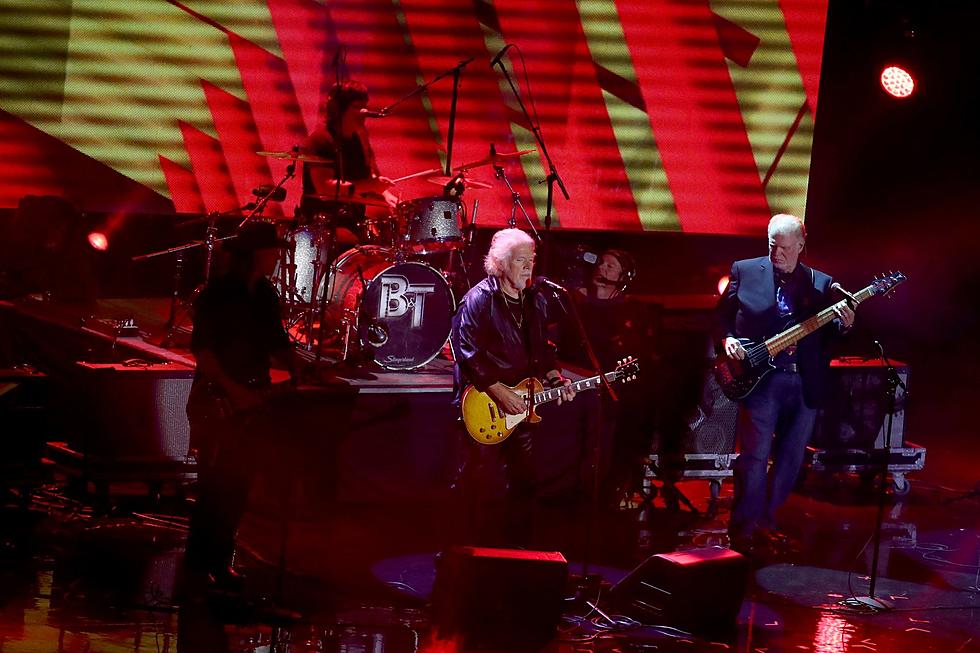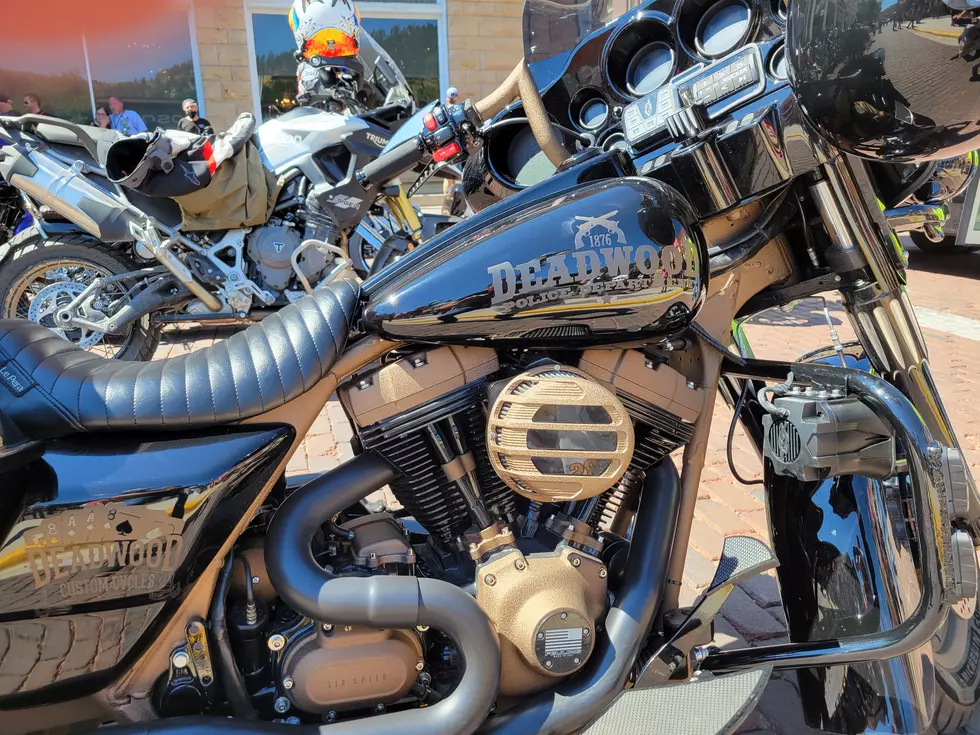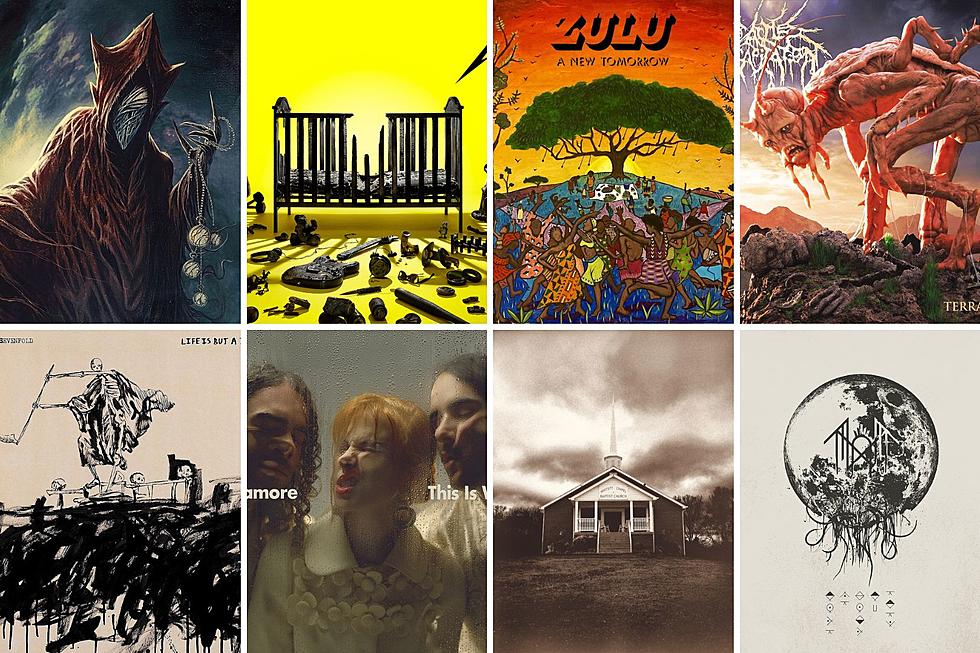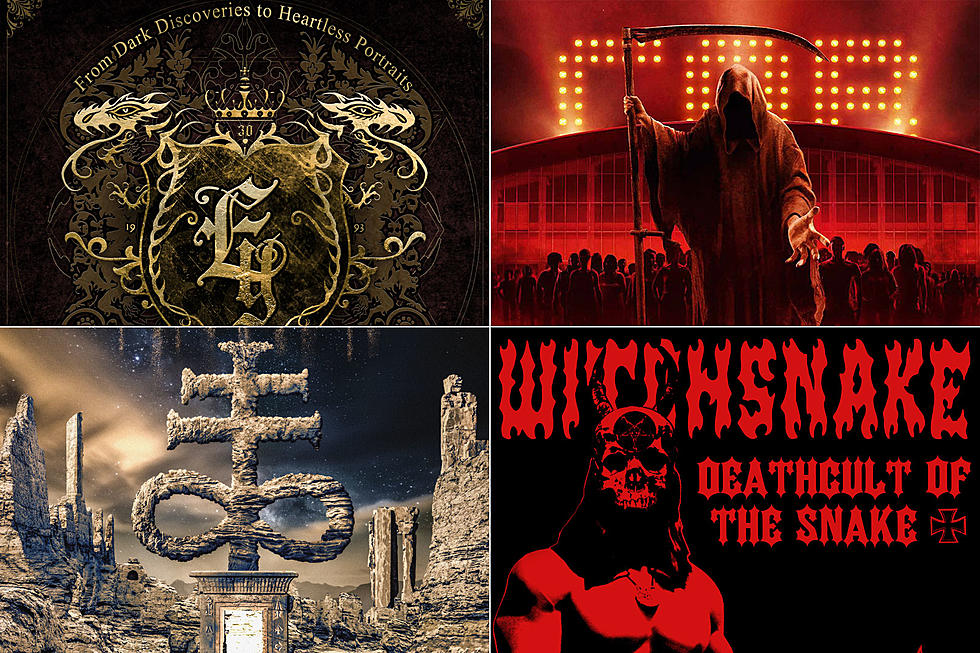
40 Songs With Titles Not in the Lyrics
The history of music is filled with songs that never mention their titles in the lyrics. From the earliest recorded reports, songs were named "ballads" or "hymns" or something similar to reflect their purpose and serve as a guide for those who wanted to follow, or sing, along.
Even into the 20th century, songs were often titled "blues" and "rags" to give listeners some idea of where things were headed. But as you'll see in the below list of 40 Songs With Titles Not in the Lyrics, things took a more complicated turn during the rock era when artists would randomly attach a set of words to songs that never got around to saying their titles.
You'll find a few artists – such as the Beatles, Bob Dylan and Led Zeppelin – who had a habit of calling their songs something other than what you'd expect. This has added to much confusion over the years, especially for DJs fielding requests for something as esoteric as "The Battle of Evermore."
Our list of the 40 Songs With Titles Not in the Lyrics isn't conclusive; it couldn't be. There are plenty more songs that don't mention their titles in the lyrics, many of them by the same artists you'll see below. We picked some of our favorites to keep the list manageable.
"After the Gold Rush," Neil Young (1970)
Young's requiem for the '60s also touches on one of his favorite, career-long subjects: the environment. Although he's claimed the song was written for an unproduced movie, the mournful track sounds part of Young's other work of the era. He's altered lyrics over the years to make it more timeless; the title, though, remains elusive.
"Baba O'Riley," The Who (1971)
The opening song on the Who's classic Who's Next album was originally titled "Teenage Wasteland" when Pete Townshend was working on Lifehouse, the follow-up rock opera to Tommy. But when the project was scaled back, he had second thoughts about the title – taken from a key line in the song – and named it after his spiritual guide instead.
"Badge," Cream (1969)
Recorded right before they broke up, Cream's last single was written by Eric Clapton and George Harrison, who plays guitar under the pseudonym L'Angelo Misterioso. The return favor – Clapton was on Harrison's White Album cut "While My Guitar Gently Weeps" – got its title from the Beatles star's scribbled "bridge" note misread by his pal.
"The Ballad of John and Yoko," The Beatles (1969)
"Christ, You Know It Ain't Easy" would have had a hard time racking up airplay in 1969, just a few years after John Lennon got in trouble for dropping Jesus' name into a conversation about the Beatles' popularity. So the band took a more literal approach to their single about the press' fixation on Lennon and his new wife Yoko Ono.
READ MORE: Artists Who Peaked on Their Debut Album
"Black Dog," Led Zeppelin (1971)
Named after a Labrador that roamed the halls of the studio where the band recorded their classic fourth album, this opening song is built on a powerhouse riff and a string of words seemingly connected by their rhymes: move-groove, thing-sting, out-out. No matter – this is Led Zeppelin at their most colossal, barnstorming best.
"Blue Monday," New Order (1983)
There's nothing traditional about New Order's classic 1983 single. The rapid-fire kick drum that introduces the track continues on its own for the first 30 seconds, vocals don't appear until past the two-minute mark and there's no chorus to be found anywhere. So why would something like the song's title be included anywhere in the lyrics?
"Bohemian Rhapsody," Queen (1975)
One of the most famous songs that doesn't mention its title in the lyrics is one of the most epic. It's also one of the strangest singles to reach the Top 10 across the world. "Bohemian Rhapsody" can be broken down into six distinct parts over its nearly six-minute running time. And nowhere are the words "bohemian" or "rhapsody" uttered.
"Brain Damage," Pink Floyd (1973)
The penultimate song on Pink Floyd's The Dark Side of the Moon sums up the classic album's themes of madness and despair without ever mentioning the title. But it doesn't need to. "The lunatic is on the grass," Roger Waters sings, lamenting former bandmate Syd Barrett's mental spiral. He does quote the album title, though, in a climactic turn.
"Bullet With Butterfly Wings," The Smashing Pumpkins (1995)
"The world is a vampire," Billy Corgan sings at the beginning of the Smashing Pumpkins' enigmatically titled "Bullet With Butterfly Wings." Don't look too deep for explanations here other than Corgan's public unraveling at the time as his band and personal life splintered: "Despite all my rage, I am still just a rat in a cage."
"A Day in the Life," The Beatles (1967)
While the sweeping end track of the Beatles' Sgt. Pepper's Lonely Hearts Club Band masterwork never gets around to saying its title, "A Day in the Life" is pretty much that: a morning-to-evening replay of its Everyman's regular routine. Inspired by a real newspaper headline, John Lennon and Paul McCartney wrote two distinct parts.
"D'yer Mak'er," Led Zeppelin (1973)
With its faux reggae rhythm and seemingly tossed-off lyrics ("Oh oh oh oh oh oh, you don't have to go"), this single from Led Zeppelin's fifth album, Houses of the Holy, was designed as a joke from the start. Its easily mispronounced title was a play on reggae's homeland of Jamaica, said in a thick, exaggerated English accent.
"For What It's Worth," Buffalo Springfield (1966)
Buffalo Springfield's only Top 40 song has been used many times over the years as an anti-Vietnam War anthem, but its origins were much closer to home. Stephen Stills wrote "For What It's Worth" – for what it's worth, he never sings the title – following riots on Los Angeles' Sunset Strip after the city set a 10 p.m. curfew to curb rowdy teens.
"Hair of the Dog," Nazareth (1975)
Nazareth wanted to call their sixth album Son of a Bitch, after the title track's rallying chorus ("Now you're messing with a ..."), but the label wasn't having that. So the album and song were renamed Hair of the Dog, a reference to the popular hangover cure of imbibing in the same spirit that led to the morning-after headache in the first place.
"How Soon Is Now?," The Smiths (1984)
The title of this 1984 classic – originally a B-side that took on new life as one of the Smiths' greatest songs – explicitly asks the question on singer Morrissey's lips: "When you say it's gonna happen now, when exactly do you mean?" Even with almost seven minutes to ponder, the answer never arrives.
READ MORE: Rock's Biggest Comeback Albums
"Hymn 43," Jethro Tull (1971)
Ian Anderson has dismissed interpretations of Jethro Tull's Aqualung as a concept LP about religion, noting that only a handful of songs are about the subject. This is one of them. With an "Our Father" and a "Jesus saves," "Hymn 43" is structured like a devout song, without ever saying the word "hymn." Or explaining that numerical designation.
"Immigrant Song," Led Zeppelin (1970)
Ice, snow, hot springs, Valhalla, green fields, gory tales, overlords and the hammer of the gods all show up within the two-and-a-half minutes it takes "Immigrant Song" to travel from its opening feedback hiss to the gallop-stopping conclusion. The idea of settling into a new land is pretty clear, even if immigrants aren't mentioned by name.
"Inner City Blues (Make Me Wanna Holler)," Marvin Gaye (1971)
The third single from Marvin Gaye's landmark 1971 album What's Going On never includes its title in the lyrics. Gaye's parenthetical subtitle, "Make Me Wanna Holler," however, appears in the "Inner City Blues" chorus after he issues a list of urban frustrations, which includes rockets, inflation, crime and trigger-happy police.
"Karn Evil 9," Emerson, Lake & Palmer (1973)
"Karn Evil 9" is spread over four tracks, 30 minutes and two sides of Emerson, Lake & Palmer's 1973 LP Brain Salad Surgery. But the words "Karn Evil 9" never appear. The second part of the first impression does, however, include a line that gave the trio's 1974 live album its title: Welcome Back My Friends to the Show That Never Ends.
"Life During Wartime," Talking Heads (1979)
This ain't no party. This ain't no disco. This also ain't a song that mentions its title in the lyrics. David Byrne wrote "Life During Wartime" as a post-apocalyptic tale about some secretive things going on behind the scenes, presumably across the U.S.: Houston, Detroit and Pittsburgh are all mentioned by name, as is Talking Heads' HQ, CBGB.
"Lithium," Nirvana (1991)
Kurt Cobain was no stranger to oblique track names (see paradigm-shifting "Smells Like Teen Spirit"), and he often cloaked his best songs under the guise of misleading titles. "Lithium" at least boasts a connection: "I'm so happy because today I found my friends. They're in my head," sings the narrator, suffering from, most likely, manic depression.
"Longview," Green Day (1994)
Green Day's breakthrough hit is about being jobless, sitting around being bored and alleviating that boredom by masturbating. The song was originally called "Same Old Shit (I'm Fucking Wasted)," a more fitting title. But after first playing the song in the small town of Longview, Wash., the band's roadie suggested a name change.
"Misty Mountain Hop," Led Zeppelin (1971)
So close. Robert Plant nails two-thirds of this song's title within the song – sorry, "hop." "Misty Mountain Hop" can be also found on the B-side of "Black Dog," another Led Zeppelin classic that can't quite mention the song's title. Like "Ramble On" and "The Battle of Evermore," it's another Tolkien-inspired track by the Hobbit-loving Plant.
"New York Mining Disaster 1941," Bee Gees (1967)
The title of Bee Gees' first U.S. single could also be the name of a historical book or at the very least a well-researched magazine story about miners trapped underground, hoping for a rescue team before the air runs out. "I keep straining my ears to hear a sound. Maybe someone is digging underground," the Gibb brothers sing in harmony.
"#9 Dream," John Lennon (1974)
Was there a "#4 Dream"? Or a "#7 Dream"? Lennon never said. He was separated from Yoko Ono at the time and with May Pang, who can be heard on backing vocals. The song (which indeed came during a dream) was recorded during Lennon's Lost Weekend and includes the same string arrangement he used when producing Nilsson.
"Paranoid," Black Sabbath (1970)
It's hard to tell exactly what Ozzy Osbourne is singing in the relatively brief title track of Black Sabbath's second album. But we're pretty sure "paranoid" isn't in there. Written as LP filler while the band was on tour supporting their debut, "Paranoid" was the first of only two charting Sabbath U.S. singles of their nearly half-century career.
"Positively 4th Street," Bob Dylan (1965)
Unlike many of Bob Dylan's confusingly titled songs, "Positively 4th Street" has an explanation ... sort of. Reportedly written about the folk fans from the Greenwich Village scene who turned on Dylan when he went electric, the single-only release didn't hold back: "You've got a lot of nerve to say you are my friend."
"Rainy Day Women #12 & 35," Bob Dylan (1966)
Bob Dylan is among the leaders of artists who seemingly assign random titles for their songs. His contributions alone would make up an extensive list. Case in point: "Rainy Day Women #12 & 35." Why isn't it just called "Everybody Must Get Stoned" after its famous boozy refrain? Is there a biblical connection to the title? Who knows?
"Smells Like Teen Spirit," Nirvana (1991)
Albinos, mosquitoes and libidos all collide in Nirvana's breakthrough song. But there are no teens, spirits or smells (but there is a "taste") in there. Famously, the song was named after something Bikini Kill frontwoman Kathleen Hanna wrote on Kurt Cobain's wall: "Kurt smells like Teen Spirit," referring to a deodorant brand. Revolution followed.
"Song 2," Blur (1997)
Glance at the track listing for Blur's self-titled 1997 album (their fifth overall), and "Song 2" makes sense: It's the second song on the LP. But that's about as far as the connection between the track and its title goes. Best known for its distinctive "woo-hoo!" hook, the short song (it just reaches two minutes) is the British band's biggest U.S. hit.
READ MORE: Top 40 Debut Rock Albums
"Space Oddity," David Bowie (1969)
Outer space was all the rage in 1969, with the first man setting foot on the Moon that summer. A little more than a week before that historical event, little-known British singer David Bowie released an allegorical song about an astronaut stuck in space. A play on 1968's sci-fi classic 2001: A Space Odyssey, "Space Oddity" arrived at the right time.
"Subterranean Homesick Blues," Bob Dylan (1965)
Little surprise the words "subterranean homesick blues" aren't mentioned in Bob Dylan's first Top 40 single. Songs with "blues" in their title rarely include the word. Plus, we're talking about Bob Dylan, whose carefree approach to naming his songs could be considered neglect in some countries. It's a tongue-twister of a singalong either way.
"Suite: Judy Blue Eyes," Crosby, Stills & Nash (1969)
Crosby, Stills & Nash's "Suite: Judy Blue Eyes" is indeed a suite: The seven-and-a-half-minute song (trimmed by three minutes for the single version) moves through four sections. Stephen Stills wrote the song for his girlfriend at the time, Judy Collins, whom he was on the verge of breaking up with when the superstar trio recorded this track.
"Sympathy for the Devil," The Rolling Stones (1968)
The Rolling Stones had more than six minutes to utter the title of their 1968 song "Sympathy for the Devil," but even with all that time they never managed to piece together the words. There's a "sympathy" in there near the end, but the best Mick Jagger can do as far as the other part is a tossed-off "Just call me Lucifer."
"Tomorrow Never Knows," The Beatles (1966)
John Lennon famously borrowed lines from the LSD handbook The Psychedelic Experience: A Manual Based on the Tibetan Book of the Dead for the Beatles' mind-bending and career-shifting Revolver closer, "Tomorrow Never Knows." Its title, however, like "A Hard Day's Night," came from something bandmate Ringo Starr said.
"Train in Vain," The Clash (1979)
The Clash's breakout U.S. single wasn't even supposed to be on London Calling. The LP's original pressing omits the song in the listing, tacking it on at the end. When the catchy "Train in Vain" was released as a single, the American label helped out confused listeners by adding a parenthetical "Stand by Me," named after the chorus, to the title.
"Trampled Under Foot," Led Zeppelin (1975)
No big surprise here, the barely comprehensible lyrics of Led Zeppelin's "Trampled Under Foot" are about sex: "Greasy slicked-down, groovy leather trim. I like the way you hold the road, mama, it ain't no sin." It was inspired by Robert Johnson's "Terraplane Blues," which followed the same path four decades earlier.
"The Weight," The Band (1968)
Everyone the narrator of "The Weight" meets has a favor to ask. With each growing request ("I will fix your rack if you'll take Jack my dog"), the burden gets heavier. That's the "weight" of the title. Robbie Robertson wrote the Band's first single based on people he and his bandmates knew, including load-lightening Fanny and fog-creeping Chester.
READ MORE: The Best Albums From Classic Rock's Biggest Acts
"White Rabbit," Jefferson Airplane (1967)
Rabbits do appear in Jefferson Airplane's 1967 hit song, but there's no mention of their color. (Curiously, the knight and queen also mentioned are described by their respective colors.) Inspired by Alice's Adventures in Wonderland, and a whole lot of drug taking, "White Rabbit" became a key song during the psychedelic-soaked Summer of Love.
"Yellow Ledbetter," Pearl Jam (1992)
"Yellow Ledbetter" is one of Pearl Jam's most enigmatic songs. Recorded for their debut Ten but left off before surfacing as the B-side of the "Jeremy" single, the song's guitar intro owes much to Jimi Hendrix's "Little Wing." Lyrically, it's a head-scratcher. The "Ledbetter" in the title, but not in the song, was a friend of singer Eddie Vedder.
"Young Turks," Rod Stewart (1981)
Rod Stewart gets close to singing the title of his 1981 Top 5 hit "Young Turks" but just can't get it all out: "Young hearts be free tonight" is the best he can do. Thematically, though, he's in the right ballpark. A "young Turk" is a term for a rebellious kid; the wayward teens Stewart sings about – one ends up pregnant by the end – fit the bill.
Top 100 Classic Rock Artists
Gallery Credit: UCR Staff
More From KYBB-FM / B102.7










